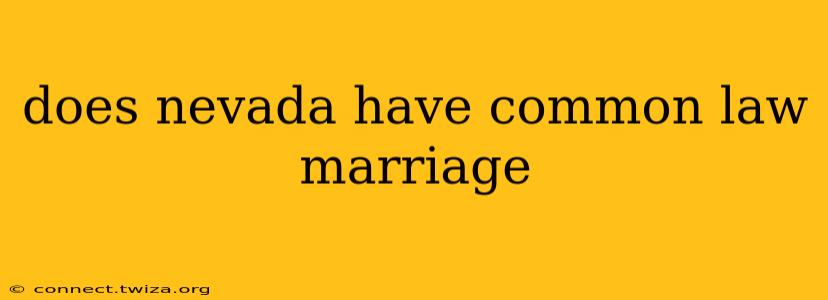Nevada, known for its quickie weddings and vibrant entertainment scene, doesn't recognize common-law marriage. This means that simply living together and presenting yourselves as husband and wife doesn't automatically grant you the legal rights and responsibilities of a married couple under Nevada law. This can have significant implications for property division, inheritance, and other legal matters. Let's delve deeper into this topic to clarify any misconceptions.
What is Common Law Marriage?
Before we dive into Nevada's stance, it's crucial to understand what constitutes a common-law marriage. Also known as informal marriage or informal union, it's a legal arrangement where a couple is recognized as married without obtaining a marriage license or having a formal ceremony. Typically, three elements must be present to establish a common-law marriage:
- Cohabitation: The couple must live together.
- Presentation to the public as husband and wife: They must hold themselves out to family, friends, and the community as a married couple.
- Mutual agreement to be married: Both individuals must have a mutual intention and agreement to be married.
Why Doesn't Nevada Recognize Common-Law Marriage?
Nevada abolished common-law marriage in 1941. Prior to that date, common-law marriages were recognized in the state, but the law was changed to require a formal marriage license and ceremony. The legislature’s decision to eliminate this legal pathway reflects a desire for clearer legal definitions of marriage and property rights. This ensures consistency and reduces potential disputes and ambiguities related to marital status.
What Happens if a Couple Believes They Have a Common-Law Marriage in Nevada?
Even though Nevada doesn't recognize common-law marriages formed after 1941, a couple might mistakenly believe they have one. In such situations, proving a common-law marriage formed before 1941 can be extremely challenging, requiring substantial evidence to meet the requirements outlined earlier. This evidence often includes:
- Witness testimonies: Accounts from individuals who observed the couple living together and presenting themselves as married.
- Joint financial accounts: Shared bank accounts, tax returns filed jointly, or other financial documents showing a shared financial life.
- Property deeds: Documentation showing joint ownership of property.
- Letters and correspondence: Personal letters or communications referring to each other as husband and wife.
What are the Implications of Not Having a Formally Recognized Marriage in Nevada?
The lack of legal recognition of a common-law marriage in Nevada has significant legal implications. Without a formal marriage, a couple will not have:
- Spousal benefits: This includes healthcare benefits, Social Security survivor benefits, and inheritance rights under Nevada's intestacy laws.
- Automatic inheritance rights: Without a will, property will be distributed according to Nevada's intestacy laws, which may not align with the couple's wishes.
- Simplified property division: In the event of a separation or death, property division becomes far more complex and potentially contentious.
How Can Couples Protect Their Rights in Nevada?
To avoid legal complications, couples in Nevada should always obtain a marriage license and have a formal wedding ceremony. This legally establishes their marital status and protects their rights and interests. Alternatively, if a couple wishes to remain unmarried, a well-drafted cohabitation agreement can clearly define property ownership, responsibilities, and other aspects of their relationship. Such an agreement protects both parties' interests should the relationship end.
Can I move to Nevada and have my common-law marriage recognized?
No. Nevada will not recognize a common-law marriage established in another state unless it was established before Nevada abolished the practice in 1941. Even then, proving this requires extensive documentation.
What if I was in a common-law marriage before 1941?
If you believe you were in a common-law marriage in Nevada before 1941, it's crucial to consult with an experienced Nevada family law attorney. They can guide you through the process of proving your marriage and protecting your rights.
This information is for general guidance only and does not constitute legal advice. Always consult with a qualified legal professional for advice tailored to your specific circumstances.
